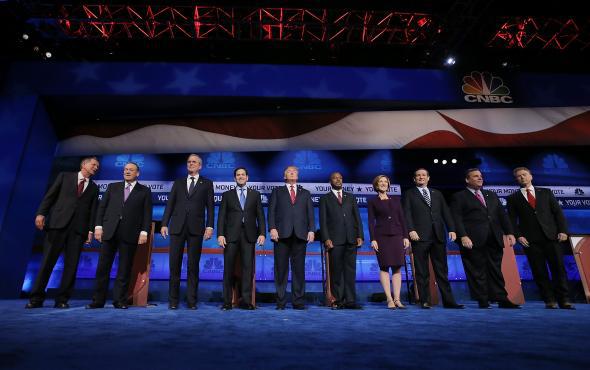So much for the Republican field’s newfound camaraderie in the wake of the CNBC debate.
This past Sunday representatives for the majority of the GOP contenders met at a Washington, D.C.-area hotel to hash out a list of demands for how they want future primary debates to work. The informal working group emerged from the meeting without a final must-have list, but they nonetheless sent a clear sign to both the Republican National Committee and the networks that they would be the ones calling the shots.
Several days later, that unified effort doesn’t look so unified—nor do their demands even look all that much like demands. (I won’t say I told you so … but I will provide a link that does that for me.)
By Politico’s count, the list of presidential candidates who have agreed to co-sign the letter that was to make the group’s wishes clear to future debate hosts currently stands at a whopping two: Ben Carson and Bobby Jindal. Those who have said they have no plans to sign it include: Donald Trump, Ted Cruz, Jeb Bush, Carly Fiorina, John Kasich, Rand Paul, and Chris Christie. (Trump, as Trump does, says he plans to go it alone on the negotiating front—even though he was one of the original organizers of this past weekend’s campaign summit.)
Those who haven’t explicitly committed one way or the other, meanwhile, are also singing a different tune after a few days of bad press. During the debate, Marco Rubio drew cheers when he complained about the mainstream media’s “double standard” when it came to Republicans. During an interview with Fox News’ Greta Van Susteren on Tuesday, though, the Florida senator complained that the CNBC moderators asked questions “that had nothing to do with the economy” but suggested there was no need for widespread change. “I don’t have any other complaints,” he said. “Debates are supposed to be tough.”
The most recent draft of the letter, meanwhile, now reads less like a list of demands and more like a polite request for logistical information. Gone are the early requests that the networks promise to do away with “lightning rounds” and yes-or-no questions, while providing candidates with the chance to give opening and closing statements and campaigns with final say over on-screen biographical graphics. Also gone: The much-mocked request that networks promise to keep the temperature in the debate hall below 67 degrees. The only thing resembling an actual demand that remains in the current letter is a question asking if the networks will “commit to provide an equal number of questions to each candidate.” Even that is a drastically toned down version of the original request, which called for moderators to “commit to provide equal time/an equal number of questions of equal quality (substance as opposed to ‘gotcha’ or frivolous) to each candidate.”
The challenge for the GOP rivals was always going to be finding consensus given that their varied interests are often in conflict with one another. After several days of negotiations, it’s become clear that the only thing they ever really agreed on was that it was to all of their advantage to attack their questioners to avoid answering the questions. Even that, though, isn’t working out quite like they hoped.
Elsewhere in Slate:
